In The Creative Operations Podcast, Kevin Groome speaks with Michele Whaley, a long time expert in local franchise marketing with experience in restaurant, hospitality, healthcare and beyond. Michele shares her insight on supporting local franchisees with a unique approach on how to empower them to be successful out in the field.
Michele, is there anything else you'd like to offer us today in terms of your background?
I think one of the things about my background that blends a little bit of insight to my way of thinking is that I came from the agency world. I started my career working for a fully integrated advertising, marketing digital agency. So, I spent half of my career leading account service departments, and the other half of my career where I've been the Director or VP of Marketing on the client side in franchise businesses.
With one foot in each of those worlds, how do you leverage what makes the franchisees strong and what insulates them from the things that are less familiar to them in marketing operations? How do you insulate them from risk, and also leverage their strengths?
I think you first have to approach it from where they come from. What's their background? Are they an ops person? Then I put a different hat on when I'm talking to them. It's more of a consultative one-on-one approach, if they don't have a marketing background. Whereas if it's a marketing person, the last thing you want to do is approach them with "Marketing 101".
I think it's tailoring your communication to who you're talking to and working with and making sure that they understand what the brand has to offer. There's a reason why franchisees buy into a franchise organization. There's a lot of built in stability, so helping and guiding them through what exists for their brand and the resources and tools that they have, so they don't have to do it all themselves.
You've been speaking of brands as resources for franchisees, and sometimes brands have enormous libraries that typical franchises would have difficulty navigating. Today, when things are changing from one market to the next and from one moment or one week to the next within markets, how can brands really help their individual local marketers get to what they need when they need it? What tips might you offer to folks who are trying to help franchisees when they want to look at the brand as a resource, but don't know how fully to engage with it?
I think the more that you can communicate and over-communicate, whether it be a podcast like we're doing now, a webinar that you're having weekly or monthly, or online training classes; just making sure that you are communicating with the franchisees about all the tools and services that exist at the brand level, because what I've found in my past life is a lot of times they have no idea because they're so mired down with the day-to-day operations. After all, that's what they should be doing. Running the business and making money. The last thing on their mind usually is marketing. So if we can guide them and let them know where these tools or resources are available and how it will help them, so they don't have to spend so much time on marketing because a lot of the tools or resources exist and also sharing best practices that other franchisees have done that have proven to be successful.
You know, it's so interesting that you mentioned that. On LinkedIn today, there was a great piece about a restaurant brand called Marco's pizzeria in which they've been talking about how they saw their revenues actually rise during the pandemic. When so many restaurants are struggling, Marco's is really setting records week to week, month to month, in a pandemic environment. And what they talked about in that piece was the way they've reached out to their franchises more, not less. More to offer them kind of a white glove experience at a certain point in time. And one of the benefits that came out of that was they've all become more familiar with resources that have been there for months or maybe years and they didn't know were there, but also I've put in context the resources that are particularly relevant at this moment in time, whether that's way finding signage or menus that have changed or policies and procedures that are changing from day to day and week to week. So it's a great example, I think, and for the folks on the call, if you take a look on LinkedIn at Marco's pizzeria, you'll find a great case study of how embracing franchisees in the way that Michele is describing is going to have an immediate benefit and could have a long-term benefit too. Speaking of the long-term benefit, I want to turn to brand integrity. Creativity and brand integrity are things that brands talk about all the time and franchisees sometimes look at with a little bit of a question mark behind it.
They're so interested in driving revenues, or driving sales tax, or whatever their metric might be. But Michele, what's the role of brand and creative in that envelope that you as a brand marketer care for us, so diligently? What's its role in this kind of crisis time, do you think? Is it more important or has it been put on the back burner?
That's an interesting question. So my answer to that is honestly, I put the consumer in the mindset. So what is the consumer's mindset? The consumer wants trust. They want reliability. So that makes me say that brands and the essence of the brand and what consumers know and love about a brand is at the forefront and it needs to be at the forefront. Operations are key and are critical, but you need to let your consumers know that you care about them, you're thinking about them and how you're handling their safety during this particular situation is key. It should be at the forefront of everything that you're doing.
The last thing you want is for a consumer, especially in this particular time period, to think you're taking advantage and selling something to them. You want them to know you are here for them, and you're here to provide them with tools and resources to make their lives easier.
That's one of the points that I've noticed as we look at some of the restaurants and franchise brands that are really driven by face-to-face engagements, we've seen the role of the brand in the safety communications being a super important thing for franchisees. Precisely because we don't want them to get into any kind of legal ambiguity, or to communicate something that is even a slight deviation from what really needs to be set at a time when consistent messaging is more important than ever. So, we've seen actually a rise in the use of static assets on CampaignDrive systems at Pica9.
In addition to the typical kind of dynamic and customizable templates, we've seen much heavier use of static assets precisely because the brand knows that sometimes that authoritative message from on high is really comforting to users. At the same time, splitting the difference between what a brand is saying and what health professionals or the health infrastructure, whether that's the CDC or whomever it might be; making sure that those messages from authoritative sources are clearly delineated from the brand, but they're still delivered by the brand is another thing that I think has been really important in the current circumstance.
So, let me ask you a question that's really driven by one of the great analysts in this category that we operate in and that's Forrester's: Jay McBain. He's often referred to three different ways that franchisees like to engage with their brand support and I think Michelle had tied very well into the way you described meeting a franchisee where she or he is at in terms of their marketing skills and marketing background. Jay talks about three models: do it with me, do it for me, and let me do it on my own. When you think about both consumers and franchisees, do you think one of those models, is getting more emphasis? How do you feel about that in terms of the closeness between the brand and the franchisee?
That's a great question at this particular point in time. I think it's most important for the franchisees, corporate, and the franchise to be aligned because the franchisor is here to support the franchisee, especially in difficult times like this.
And as you mentioned before, whether it be resources and tools and information coming directly from the CDC or WHO, I know what we had done is we made sure that we had all those materials and we were properly saying and we weren't acting like the information was coming from us, like we were making it up. We're acting like this information is coming from the CDC or the World Health Organization. So consumers knew that we had a source of truth because that is the source of truth and so I think that being inside able to provide those resources and tools for the franchisees was a huge sigh of relief for them because they knew that we were here and we have their back and our job is to support them and help them continue to grow and prosper.
Is there any other aspects of a franchise marketing today, that you think would be useful for folks to keep in mind as they try to support franchisees, but not get in their way, embrace them without suffocating?
No, it's a great way to put it actually; embrace them without suffocating. I think the biggest words of wisdom advice that I could give is don't try to make or force franchisees to do something because you think it's the right thing. I think if you approach it from a consultative role and understand where the franchisee is coming from, because every single franchisee has a different local situation that they're dealing with a lot of similar situations to others, but to try and think that you can approach it from a cookie cutter standpoint is not the right way. Sure, the brand has to be the foundation and you should not deviate from brand standards. However, I can't say enough how important it is to make sure that you have that localization.
Because a lot of people now, too, want to support local businesses. And unfortunately, sometimes people think when they see a franchise brand, it's not clicking in their head, that it's also a locally owned and operated business with a small business person. So I think finding the balance between the corporate brand messaging, but also how to localize that, so it's relevant to the local consumer and the franchisees are getting that support is also very key.
That's a super point, we often talk about giving franchisees tools rather than simply imposing rules. We know that rules are important, but tools seem to be what they need. And if we can put a human face on those tools by connecting somebody who's not so experienced in marketing, with folks at HQ who are and where we can scale that skill and intelligence through templates, assets, and resources really intelligently, organized, and deployed. That seems to help a lot at a time when franchisees need a lot.
Click here to listen to The Creative Operations Podcast and subscribe to stay up-to-date on future episodes.
CampaignDrive by Pica9 is a one-stop-shop marketing toolkit, used by franchise brands to empower their field marketers to deploy brand consistent, local marketing campaigns at scale. Click here to see the tool in action.






